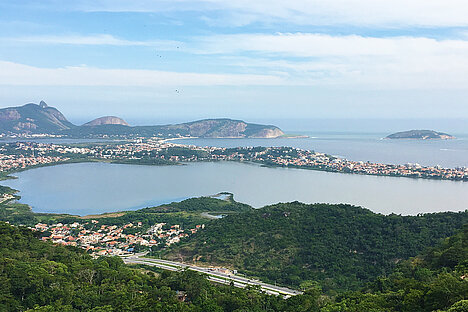- DE |
- EN
Connective Cities' virtual dialogue event
Overview
More than 40 local urban practitioners from 24 municipalities and 8 countries, fitting under the EU’s regional dimension of Eastern Partnership and Western Balkans, intensively exchanged their experiences/municipal expertise within 2 weeks of digital experience on the topic of "climate resilient urban development" and jointly developed solutions and project ideas. They followed the invitation of Connective Cities to an unprecedented and unique experience: Virtual Dialogue Event: “Climate Resilient Urban Development” on 8-19 June 2020.
It has been increasingly understood that rapid urbanization and climate risks mean greater vulnerability to urban development. Many cities worldwide face significant challenges arising from natural hazards. The Southeast European region is no exception, whereas the climate resilient urban development becomes a central pillar of local sustainability policies. Most of the countries in the region continue to face environmental and climate change challenges.
This event offered a virtual platform to discuss these challenges and supported municipalities in developing locally adapted solutions for climate challenges; in exchanging cities’ significant experience of developing successful possible options and good practises; in transforming innovative urban project ideas into digital solutions especially in the aftermath of the COVID-19 outbreak, as this latter continues to impact heavily the lifestyle at all levels including the sustainable urban development workers and it’s needed to adapt to more innovative and agile ways of working for future crises responses.
During the 2 weeks asynchronous and synchronous digital experience participants listened to inspiring Keynote presentations from leading European scientists and shared insights with peers in carefully curated Peer2Peer collaboration and exchange formats. They learned how to collaborate digitally and got acquainted with some tools, methods and the overall mindset Design Thinking.
The project has built a Network, an exchange platform of urban players, which provides a systematic access to practice-oriented solutions for sustainable urban development by facilitating change and providing mutual support.

Program
In order to be able to accommodate the discussions under the heading of “Climate Resilient Urban Development” and achieve the objectives of the Virtual Event, three following thematic priorities were identified:
- Actions towards reducing climate change impacts that include adaptation and mitigation –strengthening institutional capacities, building socio-economic and ecological resilience, facilitating information, monitoring, reporting and knowledge management systems (i.e. UNFCCC/EU commitments, MRVset-up etc);
- Effective risk management and green pandemic recovery integrated into the urban development process – COVID-19 impact on municipal vulnerability and enhancing disaster risk reduction (DRR). Effective health protection and disease control embedded into the urban planning. How to mainstream green urban recovery in the aftermath of this global pandemic?
- Mainstreaming an awareness of climate change processes into urban development planning -addressing the specific regulatory frameworks in order to support urban planners and practitioners to re-think their approaches and to incorporate climate mitigation and adaptation measures into their daily tasks and decisions.
Participants presented their good practice examples and ongoing or planned project ideas, that were incubated within 2 weeks of digital experience with listening to inspiring Keynote presentations from leading European scientists; sharing insights with peers in Peer2Peer collaboration and exchange formats; learning how to collaborate digitally and getting acquainted with some tools, methods and the overall mindset Design Thinking.
Keynotes
Trends and Drivers shaping Opportunities for Sustainable Urban Development in the Region
Nikola Stalevski
New Opportunities for Post-Corona Times!
Konrad von Ritter
Building Resilient Cities and Communities: More needed than ever
Monika Zimmermann

Presentations
Finale Präsentationen der Projektideen
Bijeljina City (Bosnia and Herzegovina) - Ankica Todorović; Mile Pejčić
Krusevac City (Serbia) - Jelena Nikolić; Jelena Brković
Korma City (Belarus) - Irina Bogdanets; Translator Olga Pirskaya
Lviv city (Ukraine) - Maksym Terletsky
Mingechevir City Municipality (Azerbaijan) - Arzu Rashidli
Mionica Municipality (Serbia) - Jasna Dragojevic
Mtskheta Municipality (Georgia) – Tamar Khoshtaria
Novogrudok City (Belarus) - Ekaterina Kivach
Novopolotsk Municipality (Belarus) – Galina and Veronika; Translator Olga Pirskaya
Ozurgeti Municipality (Georgia) – Irina Inaridze; Nana Sanikidze
Vinnytsia City (Ukraine) - Yanna Chaikovska
Results
The two weeks of the first completely virtual dialogue event: “Climate Resilient urban development in Southeast Europe (SEE)” including five webinars, several self-organized working group meetings, some "fireside chats" and a continuously filling exchange platform, was a big success story. Digital conference format worked. Despite the diversity, despite the major differences between the cities and municipalities and growing challenges, very good atmosphere, trustful and friendly relationship was built among the diverse community.
The whole event was about learning and using the collective intelligence, thinking together. It was supported knowledge exchange and networking by increasing the visibility of good practices from municipalities in SEE region on one hand, and on the other hand by facilitating the needed virtual space and tools to create innovative solutions for local challenges through knowledge exchange and peer-to-peer consultations.
This virtual event is only a new beginning, a start of our future collaboration and longer-term cooperation, whether this is further peer-to-peer consultation or virtual support. For this reason, the event gave us a virtual platform to discuss the challenges around the theme of climate resilient urban development and to support municipalities in developing new project ideas among peers that can be further implemented in the respective home communities or in the framework of existing or new thematic municipal partnerships. It also provides a systematic access to practice-oriented solutions for sustainable urban development by facilitating change and providing mutual support within the SEE region and Germany.
The Covid 19 pandemic linked the cities more closely together and not disconnected them!

Report
Detailed Workshop Documentation:
Connective Cities Regional Virtual Dialogue Event
Climate Resilient Urban Development in Southeast Europe (SEE)
8-19 June 2020
















